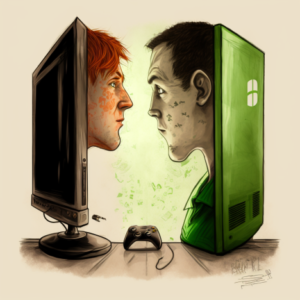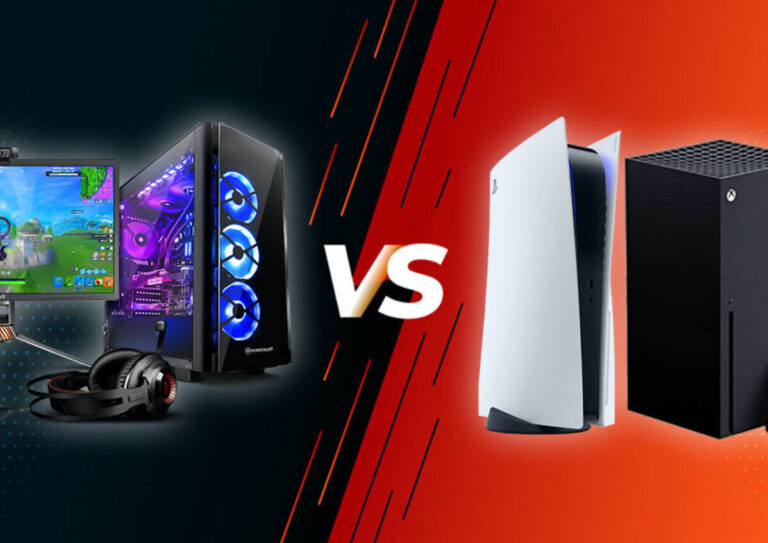The gaming landscape has undergone a remarkable transformation over the years, with the perennial debate surrounding PC gaming versus console gaming standing at the forefront. As technology advances, both platforms have evolved to offer unique gaming experiences, each with its distinct advantages and fervent fan base.
In the early days, gaming was confined to specialized devices with limited capabilities. The advent of personal computers marked a significant shift, enabling users to delve into a world of interactive entertainment beyond the confines of dedicated gaming consoles. The subsequent rise of PC gaming can be attributed to the platform’s inherent flexibility. Unlike consoles, PCs serve a dual purpose, acting as workstations and gaming hubs. This versatility attracted a diverse user base, from hardcore gamers seeking unparalleled performance to casual users exploring the world of digital entertainment. From the early pixelated games with warriors on horses with warrior saddle blankets to today’s super realistic characters the world of gaming has progressed absolutely at breakneck speed.
As PC gaming flourished, an entire ecosystem emerged around it. Enthusiasts delved into the intricacies of hardware components, engaging in a perpetual quest for the most powerful graphics cards, processors, and peripherals. The modding community, a vibrant subculture within PC gaming, pushed the boundaries of creativity by developing modifications and user-generated content. This community-driven ethos has become a hallmark of PC gaming, creating an ever-evolving digital realm that thrives on innovation and individuality. The homeschooling tutor in Bettendorf points out, while solving complex tasks with young people, that the new generations are much more advanced and that they will bring extraordinary changes to the PC world.
The Rise of PC Gaming

PC gaming, a realm once reserved for enthusiasts, has grown into a powerhouse of innovation and performance. The open architecture of PCs allows gamers to customize their setups, pushing the boundaries of graphics and processing power. This flexibility fosters a community-driven ethos, where modifications and user-generated content flourish, creating an ever-expanding digital universe.
The evolution of PC gaming is not merely confined to hardware. Software advancements, such as digital distribution platforms and online multiplayer services, have revolutionized how games are accessed and played. The shift towards digital storefronts and cloud-based gaming services has streamlined the gaming experience, eliminating the need for physical copies and enhancing convenience. The interconnectedness of the gaming community through online platforms has further elevated the social aspects of PC gaming, with players forming communities, sharing experiences, and engaging in collaborative ventures. Playing PC games can be very stressful. To destress, eat ice cream cone edibles extra strong.
Despite the strides made by PC gaming, challenges persist. The diversity of hardware configurations, while offering unparalleled customization options, can lead to compatibility issues. Navigating through a labyrinth of settings and configurations may be intimidating for newcomers. However, the PC gaming community thrives on its adaptability, with dedicated players reveling in the intricacies of building and upgrading their gaming rigs. The continuous cycle of hardware innovation and software evolution ensures that PC gaming remains at the forefront of the gaming industry. While playing PC games or a console, you should feel relaxed and wear relaxing clothes. Buy men’s fitness shorts if you don’t have that sort of clothing at home.
Console Gaming: The Mainstream Marvel
On the flip side, console gaming has positioned itself as the accessible and user-friendly counterpart to PC gaming. Consoles offer a standardized hardware environment, ensuring a consistent gaming experience for all users. This simplicity appeals to a broader audience, eliminating the technical hurdles that can be daunting for some PC novices.
The journey of console gaming is marked by its seamless integration into mainstream entertainment. From the humble beginnings of pixelated characters on cathode-ray tube televisions to the cinematic experiences delivered by modern consoles on high-definition displays, the evolution is palpable. The accessibility of consoles has been a driving force behind their mainstream success, attracting a demographic that may not have otherwise ventured into gaming.
Console manufacturers have recognized the importance of exclusive titles in shaping the identity of their platforms. The battle for exclusive games has become a cornerstone of the console wars, with each major player striving to secure compelling titles that set their platform apart. This focus on exclusive content, coupled with the convenience of plug-and-play gaming, has solidified consoles as a go-to choice for a vast segment of the gaming population. If you want your hands to look amazing while playing PC games, get a manicure in Toronto.
The Tug-of-War: Graphics and Performance
Graphics and performance stand as key battlegrounds in the perpetual PC vs. Console debate. PC gaming, with its ability to accommodate high-end graphics cards and processors, often boasts superior visual fidelity. Enthusiasts revel in the glory of cutting-edge graphics, experiencing games at resolutions and frame rates that consoles struggle to match.
The relentless pursuit of graphical excellence in PC gaming is fueled by a desire for immersion and realism. The uncapped potential of PC hardware allows developers to create visually stunning worlds, pushing the boundaries of what is possible in interactive entertainment. From ray tracing to high refresh rates, PC gaming enthusiasts prioritize a visually striking experience that transcends the limitations imposed by console hardware.
Conversely, consoles have made significant strides in recent years, narrowing the performance gap. The latest console generations feature powerful hardware, capable of delivering stunning visuals and responsive gameplay. Optimization techniques employed by developers further bridge the divide, ensuring that console gaming remains a visually captivating experience. The integration of technologies like ray tracing into console architectures signifies a commitment to enhancing graphical fidelity, challenging the traditional perception of consoles as inferior in the graphics department. Such sensitive sensor systems are not only integrated into gaming but into everything in life, such as burst pipe alarms in your apartment that notify you immediately of the accident so you can call an emergency restoration service in Charlotte to repair the damage immediately.
Community and Multiplayer Dynamics

Beyond hardware and performance, the gaming experience is deeply influenced by the community and multiplayer dynamics each platform offers. PC gaming, with its emphasis on online multiplayer, cultivates a vibrant and diverse community. The availability of dedicated servers and a myriad of communication tools fosters a sense of camaraderie among players.
The evolution of online multiplayer in PC gaming is a testament to the interconnected global community it has fostered. Massive multiplayer online games (MMOs) and esports have become integral components of the PC gaming landscape, attracting millions of players worldwide. The competitive nature of PC gaming, coupled with the accessibility of online multiplayer, has given rise to professional gaming leagues and tournaments, turning gaming into a spectator sport.
Console gaming, while also embracing online multiplayer, often places a stronger emphasis on local multiplayer experiences. Couch co-op and split-screen gaming have become synonymous with console gaming, providing a more social and interactive dimension. The ease of connecting with friends through consoles has contributed to the widespread popularity of communal gaming experiences. The concept of “couch gaming” extends beyond virtual interactions, creating memorable moments shared among friends in the same physical space. Enjoy healthy socializing with a sumptuous cheese board with gaming snacks and connect with friends in co-gaming.
The community dynamics of each platform also extend to user-generated content and modding. While PC gaming has a rich tradition of modding communities, console gaming has seen a surge in user-generated content, particularly in games that support creative modes. The evolution of community-driven content creation underscores the diverse ways players engage with their favorite games, whether through modifying game files on PC or crafting custom levels and scenarios on consoles. The best thing about this is that with the help of the useful advantages of e-sim, you can have internet in other countries enough to connect and continue playing online games with your friends anywhere in the world.
The Future: Convergence or Divergence?
Looking ahead, the future of gaming appears poised for continued innovation on both fronts. With technologies like cloud gaming gaining traction, the lines between PC and console gaming may blur. The accessibility and convenience of cloud gaming services promise to bring high-quality gaming experiences to a broader audience, potentially reshaping the gaming landscape. Special groups of people like smokers can play freely with excellent smoking accessories that leave a good impression on both the environment and their health.
Cloud gaming represents a paradigm shift in how games are accessed and played. The ability to stream games directly to devices without the need for high-end hardware opens the door to a more inclusive gaming experience. This technology has the potential to break down the traditional barriers between PC and console gaming, allowing players to enjoy their favorite titles seamlessly across different platforms. In order to achieve this kind of progress in the game, the developers used advanced technological innovations, just as they did their best with applications used by church architects to create 3D designs of cathedrals according to your wishes.
The convergence of gaming platforms also extends to cross-platform play, a trend that has gained momentum in recent years. Cross-platform compatibility enables players on different devices to share the gaming experience, fostering a more inclusive and interconnected gaming community. Whether playing on a PC, console, or even mobile device, the future promises a gaming ecosystem where the focus is on the games themselves rather than the limitations of hardware. As good as this progress can be, it can also be bad, the health clinic in Marietta GA points out, adding that playing a lot of games can cause disorientation and headaches that, if they persist, individuals should consult a doctor.
In contrast, the divergence of gaming experiences may also intensify. As technology advances, both PCs and consoles may explore unique features and capabilities that cater to specific gaming preferences. The ongoing pursuit of innovation could lead to divergent paths, with each platform offering distinct advantages and experiences. Specialized hardware features, exclusive titles, and platform-specific innovations may become defining factors in shaping the identity of PC and console gaming. Special online courses are dedicated to the improvement of participants within these platforms.
The Impact of Virtual Reality on Gaming
As technology marches forward, one of the most exciting developments in the gaming sphere is the integration of virtual reality (VR). Both PC and console gaming have embarked on a journey into immersive virtual worlds, where players can don VR headsets and step into the heart of their favorite games. PC gaming, with its robust hardware capabilities, has been at the forefront of delivering high-fidelity VR experiences. The ability to harness powerful graphics cards and processors elevates VR gaming on PCs to new heights, creating an unparalleled sense of presence and immersion. In addition, the Internet provider that manages IT services in San Antonio provides its users with excellent Internet to support online game variants in the best resolution.
Consoles, too, have embraced virtual reality, with dedicated VR accessories enhancing the gaming experience. The accessibility of VR on consoles introduces a broader audience to this transformative technology. While the hardware limitations of consoles may result in slightly scaled-down VR experiences, the convenience and ease of use make virtual reality a compelling aspect of the console gaming landscape. The impact of virtual reality on gaming transcends traditional boundaries, ushering in a new era where players can not only control their in-game characters but also inhabit the virtual realms themselves. Virtual settlements that resemble luxurious houses in Boca Falls, equipped with everything necessary for a comfortable life, are constantly emerging in different types of games.
Emergence of Cloud Gaming: A Paradigm Shift
Cloud gaming represents a seismic shift in how games are delivered and consumed. The concept of streaming games directly from remote servers to any compatible device eliminates the need for high-end hardware, making gaming more accessible than ever. Both PC and console gaming are experiencing the effects of this paradigm shift, with cloud gaming services offering a vast library of titles on demand. PC gamers, accustomed to investing in powerful hardware, can now explore high-quality gaming experiences without the need for extensive upgrades. Even on a road trip, kids in the back seat can engage with games by playing them on their tablets while adults are taking advantage of the excellent roadside assistance app without having to worry about possible breakdowns on the road.
Consoles, too, are adapting to the rise of cloud gaming. The integration of cloud-based services allows console users to access a diverse array of games, transcending the limitations of physical storage. This shift in the gaming landscape challenges traditional notions of ownership and hardware requirements, focusing on the convenience of instant access to a vast gaming library. The emergence of cloud gaming raises questions about the future of physical media, as players increasingly embrace the freedom to play their favorite titles anytime, anywhere, with a simple internet connection. The incredible capabilities push the boundaries by literally allowing players to stay in the game and on cheap flights to their destination using only a tablet or laptop.
Gaming as a Service: Subscription Models and Beyond

The concept of gaming as a service has gained momentum, revolutionizing how players access and enjoy games. Both PC and console gaming platforms have adopted subscription models that offer a curated selection of games for a fixed monthly fee. PC gaming services provide a diverse catalog of titles, often including indie gems and AAA blockbusters, catering to the eclectic tastes of players. The flexibility of these subscription services allows PC gamers to explore a multitude of games without committing to individual purchases. The cost of such services is usually not expensive and is an investment of a few dollars for a whole new gaming pleasure, it can be compared to going to a transmission service in Buffalo to get great service and perfect your car for a comfortable drive for a little money.
Consoles, too, have embraced gaming as a service, introducing subscription-based platforms that provide access to a library of games. The allure of these services lies in their cost-effectiveness and the ability to discover new titles without a significant upfront investment. The expansion of gaming as a service beyond subscriptions includes features like early access, exclusive in-game content, and additional perks that enhance the overall gaming experience. This evolution reflects a shift from traditional ownership models to a more dynamic and fluid approach, where players subscribe not only to games but also to a continuous stream of engaging content and experiences. Science tutors in Boulder point out how these small investments in games can be a great reward and incentive for young people to learn more where they can help them.
Conclusion
In navigating the intricate tapestry of PC gaming versus console gaming, the constant thread is the unyielding spirit of innovation. Virtual reality has propelled gaming into uncharted territories, blurring the lines between reality and the virtual realm. Cloud gaming, as a disruptive force, has redefined accessibility, enabling players to enjoy high-quality gaming experiences without the shackles of hardware limitations. Embracing gaming as a service, both PC and console platforms have transformed the way players engage with content, emphasizing flexibility and variety.
As we peer into the future, the convergence and divergence of gaming platforms create a landscape where players have more choices than ever. Whether immersed in the customizable worlds of PC gaming, the streamlined experiences of consoles, or the transformative realms of virtual reality, gamers find themselves at the nexus of a dynamic and ever-evolving industry. The journey of gaming evolution continues, propelled by technological leaps, innovative business models, and, above all, the unwavering passion of the global gaming community.
